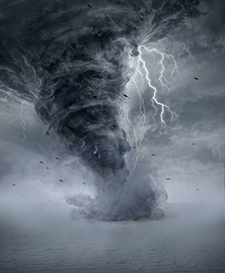Subscribe for Weekly Updates

You Never Know When Disaster Hits, So Have a Recovery Plan
 By John D. Rossi III, CPA
By John D. Rossi III, CPA
 Sometimes it can be a scary world.
Sometimes it can be a scary world.
Whether or not we want to admit it, all individuals are at risk from potential disasters, be they cyber attacks (including phishing scams), political unrest, terrorism, economic downturn, or natural disasters, to name a few. The likelihood of enduring all, or even any, of these is slight, but are you prepared if you are among the unfortunate ones?
Let’s first address cybersecurity, especially since phishing scams and malware attacks seem to be on the rise. Beware of unforeseen or unexpected messages purporting to be from software companies, educational institutions, banks, or other service providers seeking confidential data. These are phishing hoaxes or attempts to install viruses that enable thieves to steal your financial data or gain access to your computer system. Vigilance and strong antivirus protections are the best defense, but to ensure a less stressful recovery, be sure to regularly back up your computer systems and monitor your accounts for suspicious activity so you can move quickly to curtail any damage.
 Next, it is always prudent to review your insurance policies and make sure that you have sufficient coverage. To reduce the impact of a natural disaster on your property and household’s financial health, make sure your insurance is current and that it protects you from disaster, particularly those to which your region is prone. Did you know that most homeowner’s policies exclude floods or water? Maybe you did. But what you may not know is that most basic homeowner’s policies exclude other disasters, such as sinkholes, earthquakes, and tornados. Protection from the excluded events is generally available through separate riders to your existing policy. If you find during your insurance review that a disaster that is common to your area is not covered, seriously consider adding a rider.
Next, it is always prudent to review your insurance policies and make sure that you have sufficient coverage. To reduce the impact of a natural disaster on your property and household’s financial health, make sure your insurance is current and that it protects you from disaster, particularly those to which your region is prone. Did you know that most homeowner’s policies exclude floods or water? Maybe you did. But what you may not know is that most basic homeowner’s policies exclude other disasters, such as sinkholes, earthquakes, and tornados. Protection from the excluded events is generally available through separate riders to your existing policy. If you find during your insurance review that a disaster that is common to your area is not covered, seriously consider adding a rider.
In an age of credit cards and electronic transfers, we don’t often think about the importance of cash. But you may want to consider having enough cash on hand to get you through a disaster. It is a good idea to keep enough cash to last about two weeks. If cyber threats or natural disasters inhibit banking or electric systems, you’ll want enough to be able to purchase the necessities. Be sure to keep it at home in a safe place where it is quickly accessible.
Disasters can occur suddenly and without warning. They can be frightening, and they can take many forms, from electronic to natural. It is not paranoid to develop a sound plan; it is prudent. And if you are unlucky and find yourself among those engulfed in an unfortunate event, you may find some solace in the fact that you were prepared and had a plan in place.
John D. Rossi III, CPA, is an associate professor of accounting at Moravian College in Bethlehem, Pa. He can be reached at rossij@moravian.edu.







Leave a commentOrder by
Newest on top Oldest on top